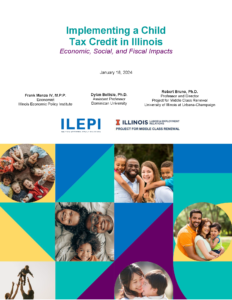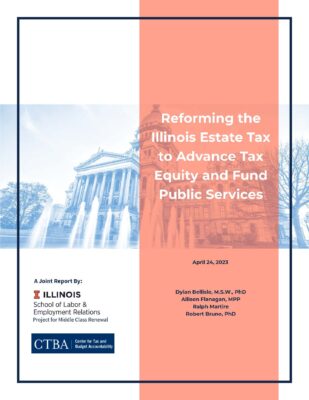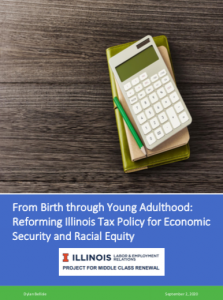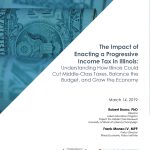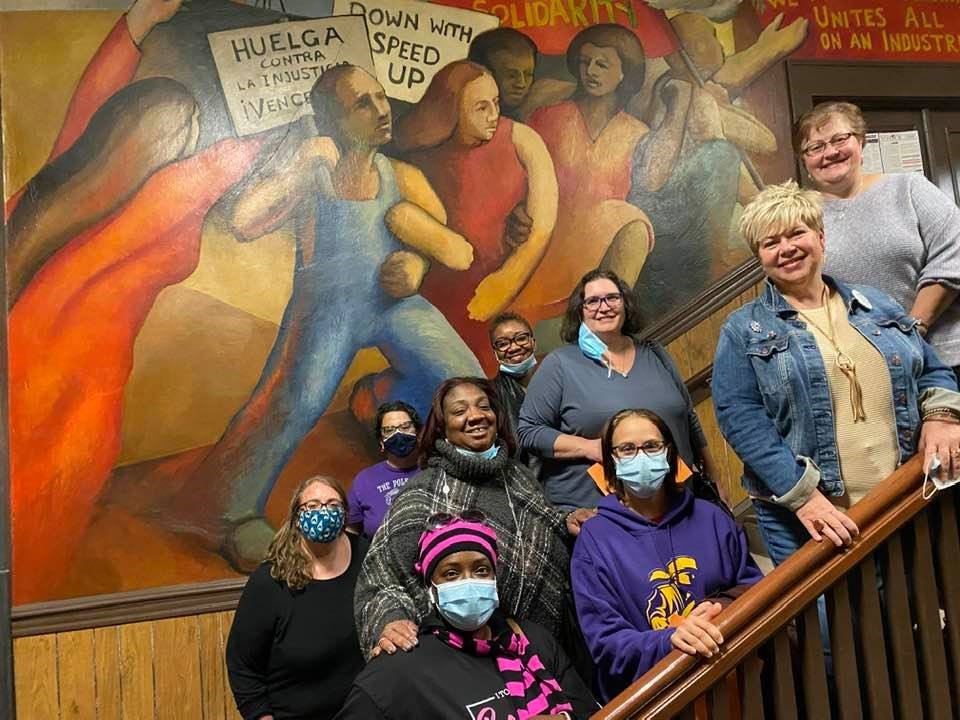
Taxes, State Revenue and Pensions
Please find reports below that discuss policy implications for a variety of topics including minimum wage increases, “right-to-work” laws, and macro-economic impacts.
IMPLEMENTING A STATE CHILD TAX CREDIT IN ILLINOIS | Economic, Social, and Fiscal Impacts
A Child Tax Credit is a credit for each child or dependent that households can claim on tax returns. The federal Child Tax Credit covers children under 17 years old and was temporarily expanded in 2021 under the American Rescue Plan Act. The expanded Child Tax Credit increased the amount of the credit, included 17-year-olds, introduced monthly payments to eligible households, and was made refundable, significantly increasing tax refunds for low- and middle-income families. With the expanded federal credit expiring but polls showing broad public approval of the policy, at least 14 states—including Illinois—have considered implementing their own Child Tax Credits. Currently, 15 states have enacted Child Tax Credits.
Read full report here.
Reforming the Illinois Estate Tax to Advance Tax Equity and Fund Public Services
Illinois is at a fiscal crossroads. The state’s General Fund has run a budget deficit for each of the past 22 years—a deficit primarily driven by the lack of revenue growth1. And while many like to blame Illinois’ fiscal woes on profligate spending on services, the data simply does not support that position. In fact, after adjusting for inflation, General Fund spending on public services has decreased over the past 23 years, with considerable reductions in critical investments like Higher Education, Healthcare, Public Safety, and Human Services.
Tellingly, Illinois has cut its spending on those core services, despite receiving over $10 billion in federal subsidies through the Coronavirus Aid, Relief, and Economic Security Act and the American Rescue Plan Act. Looking forward, all that federal fiscal relief is expected to be spent by the middle of FY 2024. Further aggravating conditions for working- and middle-class residents, Illinois is noted for having one of the most regressive tax systems in the country, placing a much greater tax burden on low-income workers and middle-class families than on affluent individuals, when tax burden is measured as a percentage of income.
While Illinois and many other states continue to struggle to create fair tax systems that have the capacity to fund vital services for their residents sustainably over time, wealth inequality has grown exponentially over the past 50 years, and now stands at a level the country has not seen in over a century. For instance, from 1963 to 2016, the most recent year in which available wealth data is stratified by percentile, the wealthiest one percent in America saw their aggregate wealth jump from an average of $1.4 million in 1963 to $10.4 million in 2016 —a whopping 742 percent increase. Over that same sequence, folks who had wealth in the 75th percentile saw their wealth grow from just over $110,000 to $368,600—a far more modest increase in both absolute and proportional terms. Moreover, the lower down the income scale one looks, the worse the disparity in wealth becomes.
Read full report here.
From Birth through Young Adulthood: Reforming Illinois Tax Policy for Economic Security and Racial Equity
The tax code is a powerful tool used to address a myriad of policy goals. Unfortunately, instead of narrowing income and wealth gaps, various tax provisions continue to reinforce historical gender and racial biases in the tax code. Some advocates argue that the Earned Income Tax Credit (EITC) and the refundable portion of the Child Tax Credit (CTC) are exceptions to the generally inequitable tax system, as these credits provide substantial support to low- and moderate-income families. Illinois has a role to play in addressing the gender and racial inequities in the tax and revenue system. This policy report outlines reforms to the Illinois tax code that would provide tax relief to Illinois parents with young children, and young adults who are at the beginning of their career. It directs addition to how changes could impact racial tax equity in Illinois
THE IMPACT OF ENACTING A PROGRESSIVE INCOME TAX IN ILLINOIS
Illinois has the one of the most unfair tax systems in the United States. In response, Governor J.B. Pritzker and the General Assembly have debated whether to amend the Illinois Constitution to allow the state to replace its flat-rate income tax system with a progressive (or “graduated-rate”) income tax. Illinois is currently one of only eight states that has a flat-rate tax, while 33 states have progressive income tax systems. The Project for Middle Class Renewal (PMCR) at the University of Illinois at Urbana-Champaign and the Illinois Economic Policy Institute (ILEPI) have jointly evaluated the effects of 8 different scenarios for adopting a progressive income tax in the state, including the governor’s proposed “fair tax.” The scenarios are intended to serve as examples for voters and lawmakers. A progressive income tax would transform Illinois’ tax code by bringing middle-class tax burdens down towards rates in neighboring states. Moving to a graduated-rate structure could make the state’s tax code fairer, cut income taxes for working-class and middle-class families, provide opportunities for property tax relief, help balance the budget, and provide revenue to fund essential public services that contribute to the growth of the Illinois economy.
LEGALIZING SPORTS BETTING IN ILLINOIS: EVALUATING POLICY OPTIONS AND FISCAL IMPACTS
If Illinois were to legalize sports betting through the Sports Wagering Act proposed last year, net revenues for the gaming industry would increase by $400 million and about 1,800 new jobs would be created at between 30 and 75 licensed locations. The proposed bills would also raise state tax revenue by between $50 million and $120 million per year. However, due to relatively high tax rates, the proposals in the Illinois General Assembly would result in nearly half of all sports betting activity remaining in the black market. In this report, the Illinois Economic Policy Institute (ILEPI) and the Project for Middle Class Renewal (PMCR) at the University of Illinois at Urbana-Champaign, evaluates several proposals to legalize, regulate, and tax sports betting. If the General Assembly chooses to move forward on this concept, a balanced framework that combines the United Kingdom’s 15 percent tax on gross gambling revenues, a $100,000 annual license fee for sports books and related establishments, and a small 0.05 percent “integrity fee” on wagers to ensure compliance and prevent fraudulent activity may offer a way forward.
THE FINANCIAL IMPACT OF LEGALIZING MARIJUANA IN ILLINOIS
There is significant public support for legalizing, regulating, and taxing recreational marijuana in Illinois. Fully 66 percent of registered voters in Illinois support legalizing marijuana, including a bi-partisan majority of Democrats and Republicans. Furthermore, 10 states and the District of Columbia have already legalized recreational marijuana. This report finds that high taxpayer costs for law enforcement and cannabis-related incarceration would be reduced by legalizing recreational marijuana. In total, Illinois taxpayers would save $18.4 million annually in reduced incarceration costs, law enforcement spending, and legal fees from marijuana legalization. This revenue could be redirected to solve other crimes– such as homicides, robberies, and assaults. The economy would also grow if Illinois were to legalize recreational marijuana. If marijuana were legalized, regulated, and taxed in Illinois, an estimated $1.6 billion would be sold in the state, in part due to regional tourism.
High-Impact Higher Education: Understanding the Costs of the Recent Budget Impasse in Illinois
Investing in higher education is a smart economic development policy that boosts incomes, supports employment, and grows the economy. Illinois has world-class public universities and community colleges that serve as economic engines in local communities. The recent budget crisis in Illinois, however, had negative impacts on public universities and community colleges in the state. This report assesses the positive economic impacts of public universities and colleges in Illinois and measures the costs of the two-year budget impasse.
